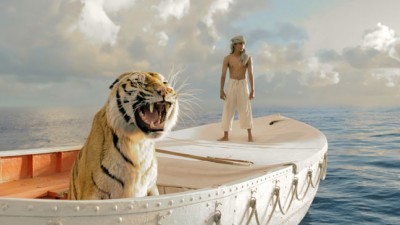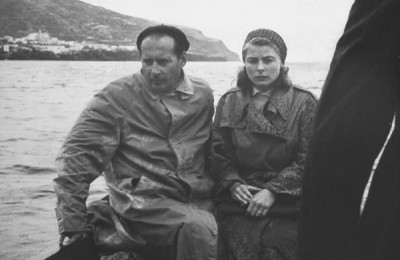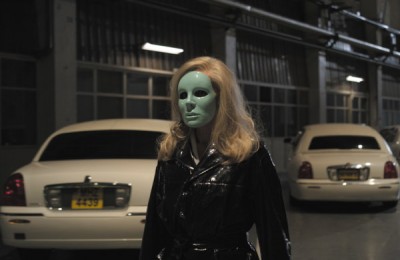
 |
|
| |||||||||||
|
Notes From the 50th New York Film Festival
by Jason Bailey  The 50th annual New York Film Festival has drawn to a close at Lincoln Center, and your humble correspondent was lucky enough to take in 31 of its feature films. (Well, 32, if you count The Princess Bride.) As with any film festival worth its salt, there was a little something for everyone to love, and a few things to—well, not necessarily hate, but certainly scratch your head over. You can read about a few films I saw before the festival here; I divvied the rest up into handy categories, in order to better digest the fest’s giant selection of fall prestige films, foreign efforts, documentaries, and WTFs: SURPRISES Life of Pi: Ang Lee's ambitious adaptation of Yann Maratel's bestseller is big, bold, and beautiful; that's no surprise. What's unexpected is how thoughtful the film is, particularly in matters of faith, which don't usually get this kind of conversational consideration in a big-budget studio 3D picture. The force of the filmmaking and the opportunity to create such a visually stunning work would be enough for most filmmakers, but Lee pushes further, and comes up with an effort whose emotional power matches—perhaps eclipses—its aesthetic fireworks. Amour: I've been a detractor of Michael Haneke's work for a while now, which has too often seemed smugly pleased with its hostility towards his audience in particular and humanity in general. That's why his powerful new film is such a revelation: for the first time in years, he treats his characters as human beings rather than vessels for his own cruelty and nihilism. The story of an elderly husband doing his best to care for his wife as she falls deeper into illness, it is obviously a story drenched in sadness. But there are flashes of warmth and even humor, and though this is a more humanized Haneke, he resists the urge to play for easy sentimentality. It's a complicated film, and a heartbreaking one.  BIG MOVIES, BIG DISAPPOINTMENTS Flight: Robert Zemeckis’s long-overdue return to live action starts off so well: his first act is utterly gripping, the film’s key flight sequence a remarkable marriage of effects, tension, and emotion. He is, as ever, a terrific craftsman: he knows how to frame, how to move his camera, how to slam his shots into each other with just the right amount of force. But he’s become a lousy storyteller. Contrary to the trailer, Flight is less about the aftermath of Sullenberger-style heroics than it is a very standard redemption-of-a-drunk/addict story. As good as Washington is (this is another entry in his interesting sideline specialty of problematic anti-heroes), its portrayals of addiction are barely more nuanced than Reefer Madness, and the wrap-up is laughable, Screenwriting 101 stuff. Not Fade Away: There's so much in David Chase's debut feature that's so good—the music, the performances, the energy, the look—that it's tempting to forgive how shallow and over-stuffed it is. Since he's working with a film's running time rather than a season's, the plethora of subplots can only be addressed glancingly; most of the scenes feel excerpted, strung together with music montages and peculiarly inconsistent narration. There's a good movie buried in here, and it occasionally peeks out, but not often enough. Passion: The universe of Brian DePalma is so stylized, from the half-winking dialogue to the silky camerawork to the cockeyed mise-en-scene, that it's hard to know how worked up we should get over how utterly preposterous his latest film is—it's set in the swanky world of advertising, but it's got all the credibility of a Dynasty re-run. Does it matter? For his part, DePalma continues to challenge our capacity as audience to laugh both with and at his films—and still leaves us wondering how much of either is intentional. But for all of its flaws (and there are many), it must be said that he wraps it up with one of the best set pieces of a recent filmography, a masterful sequence of suspense filmmaking that left this viewer in a far more forgiving mood about what came before. DOCUMENTARIES! The Gatekeepers: Director Dror Moreh’s documentary is both a portrait and procedural of the Shin Bet (Israel’s primary intelligence organization for the past 45 years)—it is both a valuable thumbnail history and a fascinating look at how the organization works. To accomplish both tasks, Moreh talks to six former heads of the organization, all of them introspective, candid, and occasionally chilling (“In the war on terror, forget about morality,†opines one). The Israeli/Palestinian conflict is one with no easy solutions, and Moreh’s film doesn’t offer any up. But it allows these men to look back on their mistakes and successes in an attempt to teach and learn from them, and many of its questions—specifically w/r/t the issue of “targeted assassination,†and the general problem of dealing with very grey issues in black and white terms—couldn’t be more timely, or urgent. Deceptive Practice: Magician, actor, author, collector, historian, and raconteur Ricky Jay is such a juicy topic for a documentary that it's a little astonishing that it took this long for it to happen. For this profile, Jay and directors Molly Bernstein and Alan Edelstein focus not just on the man himself, but on his place in the history of his fascinations. His love and infinite knowledge of these worlds and lore gives the film a framework beyond mere biography; we're immersed in a scene, a subculture, the gurus and the rivalries and the challenge. Plus, it's a fine opportunity to see not only his long-haired ‘70s television appearances, but clips from his wonderful specials, which should be easier to see than they are. Punk in Africa: A great documentary about the arts (be it a one about films, music, visual art, whatever) must have a kind of infectious enthusiasm for the subject matter that sends you scurrying away from the screen to see/hear/experience more. This is, unfortunately, not the case with Punk in Africa. Aside from the rather obvious and too sporadic narration, it's a well-made film—the cutting is appropriately fast-paced and high-energy, and we get to hear quite a bit of the music itself—and seems a comprehensive survey of the scene. But this viewer wanted a better balance between the music and the movement, since the film is so focused on the former that it seems made more for existing fans than as a point of entry for us newbies.  GET SOME CULTURE, WHY DON’T YOU Like Someone in Love: On first glance, the new film from Certified Copy director Abbas Kiarostami looks like quite the change of pace. He sets his film in Toyko, and the Iranian writer/director doesn’t even go the Lost in Translation route; it is squarely focused on a young Japanese escort and an old Japanese professor. And I do mean squarely, but that’s where the stylistic similarities occur—once again, the film is played out primarily in a series of thoughtful two-handed dialogue scenes, this time with a third party (the young woman’s jealous yet clueless fiancé) complicating matters. Kiarostami is a filmmaker who leaves in a lot of things that other films take out, but he offsets the possibilities for indulgence by leaving a great deal unsaid and presumed. The result is a film that is sensuous but not lurid, heartbreaking but not depressing, and modest yet mesmerizing. Something in the Air: The new film from Olivier Assayas feels very much like an extension of his epic Carlos—it is in love with the fierceness of purpose, the camaraderie of being “us against them,†and the sparky electricity of being part of a movement. The filmmaker is as charged up by fence-jumping, poster-plastering, and spray-painting as his protagonist Gilles (Clement Metayar) is, but he doesn’t just treat him as an rebellious found object; he’s also a very typical teenage kid, falling in love and harboring crushes and sneaking into movies for a touch or a kiss in the dark. His semi-autobiographical tale has a free-floating, off-the-cuff spirit that can shift, without warning, into an intense immediacy. Think of it as The Portrait of the Anarchist as a Young Man, which goes past its politics and period into the story we all can tell, of finding one’s own place in the world. Caesar Must Die: The Taviani brothers' mash-up of documentary and Shakespeare is a far more successful appreciation of the power of the theatre. The Italian filmmakers shot at a high-security prison that houses a renowned "theatrical laboratory," and used the real inmates that make up the company. They dramatize a production of Julius Caesar, but only a small portion of the film presents the final product on stage (and in color); the bulk of the film (in black and white) concerns the play's work-shopping and rehearsal within the prison walls, with scenes ingeniously staged in real locations and during private moments (intercutting two actors running lines in separate cells to create a "dialogue" scene, for example, or showing one delivering a soliloquy while mopping the prison floor). In a very real way, the rehearsal becomes the performance, the script moving smoothly between Shakespeare's text and the Tavianis'. But as Marc Anthony's famous eulogy unreels, the film (as all great updates and interpretations do) draws us in; we're grabbed by the clever gimmick, but retained by the ageless power of the words. Night Across the Street: Early in Raoul Ruiz's final film, he sends his characters to the movies, and has one ask, "Why do you come to the cinema, if you don't even know anything about the film you've just seen?" It's a sly little jab, as if he were anticipating the response to this befuddling yet intriguing effort. It concerns a man (Sergio Hernandez) on the verge of retirement who tells his story, some of it memory and some of it imagined. At least, that's how it starts—as a coming of age story with a pronounced absurdist streak—before flipping to a dizzy hired-killer plot in its second act, followed by a strange yet moving funereal conclusion. Some of the comedy just doesn't translate (it's more "funny" than funny), but the droll visual humor is inspired, and the picture is sweet, elegiac, and thoroughly unpredictable.  ZZZZZZZZZZ Leviathan: It's appropriate that Lucien Castaing-Taylor and Verona Paravel's documentary opens with a quote from the Book of Job, considering what an ordeal it is to sit through their film. I was an admirer of their previous effort, the sheepherding doc Sweetgrass, but this one is a murky, ugly mess: shots of dead fish, flopping seagulls, and bored fisherman held long past that point of resembling anything remotely cinematic, when we can even tell what the hell we're looking at (which is less often than you might think.) It all culminates with an endless shot of a fisherman watching television and, in a mirror of our own experience, slowly falling asleep. You Ain't Seen Nothin' yet: The latest from Alain Resnais begins with two scenes of maddening repetition to gather the players, whom we discover have been assembled following the death of the man who directed them in a production of Eurydice many years earlier. He has asked them to watch a videotape he's been sent of another production, and as they do (frame within the frame! Meta!) They begin interacting and dialoguing with it, first implicitly, then more directly, the film's set seemingly transforming into a stage one. This kind of thing can work (Vanya on 42nd Street leaps to mind), but it's all so frightfully dull that the film itself, once removed from its pseudo-intellectual construct, is like being trapped at a particularly drab staged reading.  MOVIES ABOUT MOVIES, IN DESCENDING ORDER OF QUALITY Room 237: I saw Rodney Ascher's wonderful meditation on Kubrick close-readers (and, by extension, movie obsessiveness and film criticism in general) at Sundance, but couldn't resist the opportunity to see it again; it only gets better the second time, particularly having had some time to digest the wildness of the theories and better enjoy that absolute certainty with which they're pontificated. New favorite quote, which could also be the movie's mission statement: "Just go see the movie! I figured all this out from just seeing the movie." War of the Volcanoes: This documentary account of the behind-the-scenes intrigue between productions of Stromboli (directed by Roberto Rossellini and starring his new lover Ingrid Berman) and Vulcano (starring his spurned lover Anna Magnani) ingeniously mixes newsreel footage, home movies, and clips from both films, wittily edited to draw out the connections between the onscreen narratives and the events outside the frame. The narration is too dishy/catty, and the translation is frequently problematic, but there's some terrific montage happening here, particularly in the clever intercutting of both films' climaxes, emphasizing their place as dueling halves of a much larger story. Roman Polanski: Odd Man Out: Marina Zenovich's 2008 documentary Roman Polanski: Wanted and Desired reopened the still-contentious story of the filmmaker's 1978 arrest and subsequent fleeing of the country; it also presented persuasive evidence of judicial misconduct in that original trial. But that newfound attention for the Polanski case may well have contributed to his 2009 arrest in Switzerland, which this de facto sequel examines in depth. Zenovich digs deep into questions of motivation, political and otherwise, for the actions of the Swiss and the Los Angeles DA's office, and hints on some tantalizing questions of her own responsibility (albeit too often in stilted narration like "I thought the story was over, but it was just... beginning…"). But it is also very easy, in talking about this case, to minimize the crime and the victim, and turn Polanski into an object of false equivalency. To be clear: he drugged and fucked a little girl, so spare me the talk of his "torture" and "cruelty" at the hands of law enforcement. That caveat aside, Zenovich's probing of this complex story is welcome, and she wisely makes the best of her limited access to the filmmaker by instead revisiting his victim Samantha Geimer, whose insistence that "I get to get over it" makes her easily the story's most fascinating personality. Berbarian Sound Studio: A clever if ultimately repetitive bit of meta-horror from writer/director Peter Strickland, who tells the story of a serious-minded sound mixer (beautifully played by the invaluable Toby Jones) who's hired to go to Italy and work on a particularly grim and graphic horror picture. Aside from the giallo-style fake opening credits, we don't see a frame of the film he's working on—only the studio, where lettuce is being stabbed and watermelons and being smashed. It's a risky move, because it leaves Strickland with the considerable task of creating visual interest in that single location, but it's ultimately wise, because it causes us to focus on what's going on in that room—and in Jones's head. Though the claustrophobia works, and the narrative starts to turn on itself in some very interesting ways, but Strickland spends too much of his third act spinning the old dream vs. reality wheels. And he seems to have had four or five different ideas for an ending, and chose to just stack them up one right after the other. Liv & Ingmar: The on and off-screen affair of director Ingmar Bergman and his lover/muse Liv Ullman is one of infinite fascination to cineastes. It's a great tale; this is not a great documentary. The access to Ms. Ullman is thorough—she is interviewed, she narrates (from her autobiography), she provides love letters from Bergman—and while it's vivid and personal, its intimacy couples with a pervading sense of soft focus (both literally and metaphorically) to make the whole enterprise feel less like a documentary and more like one of those Lifetime "Intimate Portraits," complete with plinky piano music and introspective, thoughtful close-ups. There are touching moments, some great stories, and inventive intercutting of clips from their collaborations as dramatization, but it’s an emotional memory film that left this movie-lover strangely unmoved.  UNCLASSIFIABLE The Paperboy: “Brace yourselves,†grinned NYFF’s John Wildman when introducing the latest from Precious director Lee Daniels, so you couldn’t say we weren’t warned. This misbegotten hybrid of legal procedural, Southern Gothic tone poem, art house Cape Fear, and “Cinemax After Darkâ€is the kind of film that either gobsmacks you with its audacity or leaves you wondering how on earth it ever happened. Some nice period touches and memorable performances by Nicole Kidman and Matthew McConoughey aren’t enough to send anyone wading through this swampy mess. Holy Motors: Leos Carax's first feature in 13 years is a daring, vast, peculiar trip, and functions (for this viewer, at least) in two parts: the first half, when you're trying to figure out what the hell he's doing and how on earth it fits together, and the second, when it snaps into place and everything seems irreplaceable. Let's be clear: some of it is baffling, and the filmmaker is occasionally peculiar seemingly for the sake of being peculiar. But even when it seems far afield, it is still fascinating, and it all adds up. I think. Maybe. Thanks, again, to the fine folks at the NYFF for having us at this year’s festivities. See you next year!
Archives
The 5 Most Influential Summer Blockbusters
Los Angeles Comic-Con Cosplay Spotlight Notes from Book Expo DVD Talk Interview: Batman: Return of the Caped Crusaders Compete Archives
Review Staff
| Newsletter Subscribe
| Join DVD Talk Forum
|
| |||||||||
| |||||||||||